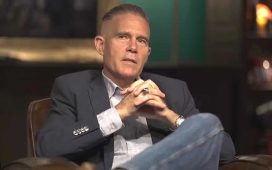What explains the stupendous success of The Traitors? More than 9 million people tuned in to the first episode of this, its third season, and last week it overtook Strictly Come Dancing to become the BBC’s most watched reality show. With this sort of trajectory, I’m afraid we must prepare for thousands of imitators to follow in its wake. So what should they be trying to do?
Part of the attraction of the show is its host, Claudia Winkleman, who presides over the setting – a luscious castle in Scotland – in the manner of a campy gothic headmistress: talking softly to owls, ruthlessly ordering contestants into coffins and gunge, and all the while managing to navigate the set through the tiny sliver of daylight between low fringe and high roll-necked jumper.
Another is the cast. Instead of the usual array of already rich influencers with one eye on their careers, Traitors contestants have more ordinary jobs: this year there is a call centre worker, a care manager, a doctor, a landscaper, a window cleaner and a barber. As most won’t benefit much from the exposure, the aim is simply to net the £100,000 prize by whatever means possible, rather than, say, to look good on camera. This makes for great TV.
But the real secret of the show is that, although it follows the usual beats of reality television – banishments at the end of an episode, alliances made and broken – it also does a good job of defying them. You get the familiar fast friendships and self-help cliches (“at the end of the day it is what it is”) and emotional meltdowns, but now there’s a lurking question behind it: how much is a front to throw the others off the scent?
Really, the show works because of its deceptively simple setup: a version of the party game Mafia, in which a handful of players are secretly deemed “traitors” and must work to bump off the rest. The “faithful”, meanwhile, get to vote off those they suspect of murder. Instead of relying on aggressive personalities or heavy producer manipulation, the drama seems to flow naturally from the conflicting incentives inherent in the game: namely, winning the trust of those with whom you are directly competing. We like The Traitors because it feels like a genuine social experiment. It seems to tell us something truthful about ourselves.
What does it tell us then? Last week the research group More in Common published a poll suggesting it reveals something about the link between personality traits and political parties. Viewers who would rather play as a blameless “faithful” were more likely to be Labour voters, while Conservatives would generally prefer to be “traitors”. More in Common’s Ed Hodgson wrote that the results made sense in light of the traits of each group: would-be traitors have, for example, a higher “threat perception”, and so do rightwing voters. This might lead them, he said, “to desire greater control” over their environment – borders, streets, classrooms or, in reality shows, becoming murderers rather than murdered. Leftwingers and “the faithful” have higher levels of interpersonal trust. “Personality dictates politics” is the argument.
after newsletter promotion
There’s a large literature on this theory – popular, perhaps, because it is alternately flattering to both tribes: the right may enjoy hearing they are more conscientious; the left that they are more open to experience. Both prefer to think of themselves as inherently superior to the other tribe. But I’ve always been suspicious of this stuff. Do we really sort ourselves so cleanly? Do regional voting patterns really tell us something about the distribution of personality types across the country? Similar findings on personality types and political allegiance emerge both here and in the US. But Democrats sign up to a very different set of values than do Labour voters. And do social groups really tend to vote the same way because each made the same decision autonomously?
In The Traitors, personality tells you little about allegiance. The faithful look fruitlessly for characteristics that may mark someone out as a traitor, and they always get it wrong. Amenable Minah is a secret traitor. Abrasive, nonconformist Dan is voted out, only to reveal himself as a faithful all along.
I wonder if this show is instead demonstrating another truth altogether. One of the most durable lessons in social psychology is the power of group influence – starting with toddlers, who interpret objects in light of the emotional expressions of others. Social groups have been shown to serve as the primary source of personal values – people shift their moral and political attitudes in order to conform. In fact, many of our decisions, political or otherwise, spring not from aspects of our individuality but the influence of those around us. Research might find a correlation between personality and politics, but to what extent are both downstream of the tribes around us – family, community and friends?
In the west, folk theories abound that we are much more autonomous than we are. The appeal of The Traitors may be that it demonstrates the power of herd behaviour: ideas, once seeded, spread. Contestants teeter on the edge of discovering who the murderers might be, only to fall helplessly into line with the rest of the group. One charismatic person can sway the rest, against their better instincts. This is entertaining stuff, but it would be a mistake to imagine these people do not represent the norm. After all, we evolved not to see things objectively but to survive in groups, which means conforming to them.
We like to imagine ourselves independent thinkers but look around – how different are your views from those closest to you?










